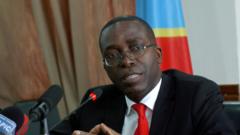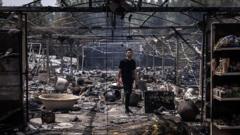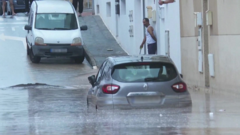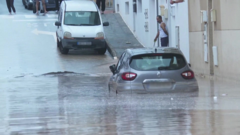The capital of the Democratic Republic of Congo, Kinshasa, is grappling with the aftermath of severe flooding caused by torrential rain, claiming at least 33 lives. The president has assured support for those affected as the city, home to 17 million, faces significant infrastructure challenges exacerbated by climate change.
Catastrophic Flooding Claims Lives in Democratic Republic of Congo's Capital

Catastrophic Flooding Claims Lives in Democratic Republic of Congo's Capital
Torrential rainfall in Kinshasa has resulted in at least 33 fatalities, with extensive damage affecting the city's infrastructure and prompting a government response to aid victims.
Torrential rains in Kinshasa, the capital city of the Democratic Republic of Congo, have led to devastating floods that have killed at least 33 people, with officials reporting widespread destruction across the city's vulnerable neighborhoods. President Félix Tshisekedi has expressed his condolences, assuring victims that the government will provide assistance following a crisis meeting.
Residents are attempting to escape rising floodwaters by swimming, wading, or using makeshift canoes. The Congo River, one of the world’s largest waterways, has recently seen its levels reach unprecedented heights, leading to widespread flooding in a city that is home to approximately 17 million people. With many areas prone to soil erosion, experts highlight that climate change has intensified flooding risks throughout the region.
Particularly hard-hit areas include west Kinshasa, where homes were swept away over the weekend. Mayor of Kinshasa indicated that around half of the city’s 26 districts are affected, with emergency services deployed for search and rescue operations. Victims have expressed anger at the government's slow response and the lack of adequate support. One resident, Christophe Bola, recounted that water levels reached perilous heights of 1.5 meters, rendering many homes uninhabitable.
In addition to the human toll, floods have disrupted water supply, with treatment facilities inundated, leaving many residents without access to clean water. Vital infrastructure, including the main road connecting the city center with the international airport, has become impassable.
The N'djili River, a tributary of the Congo, has burst its banks, contributing to the crisis in the area. Local scientists have raised concerns about pollution levels, including fecal matter, in the river stemming from poor sewage management and lack of proper urban planning. Last year, the government promised to address these longstanding infrastructure challenges, but many residents remain skeptical of progress.
Meteorological forecasts indicate that heavy rains are expected to continue, affecting not only Kinshasa but also other parts of the country in the coming weeks. The eastern city of Goma, which has faced political turmoil, is also bracing for possible flooding. As the situation develops, residents and officials alike remain vigilant and prepared for further challenges ahead.





















